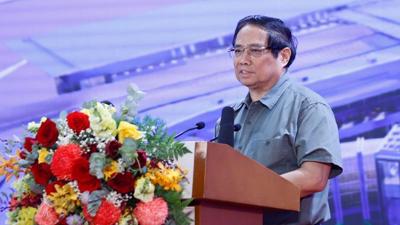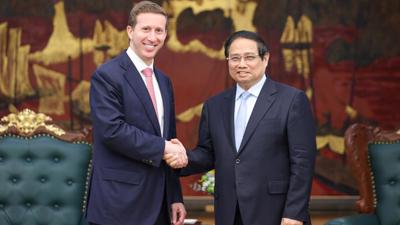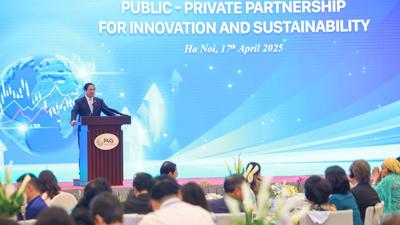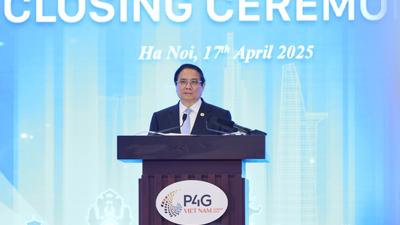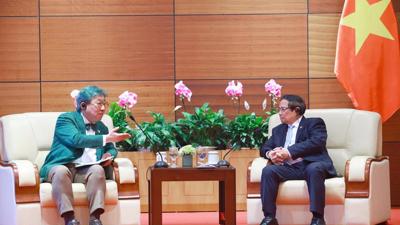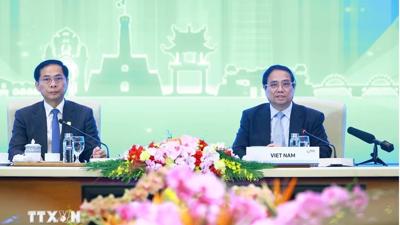PM co-chaired a dialogue with major WEF enterprises
The June 26 event, that attracted leaders of about 20 major WEF economic groups, took place on the sidelines of the 15th WEF Annual Meeting of the New Champions in China’s Dalian city.
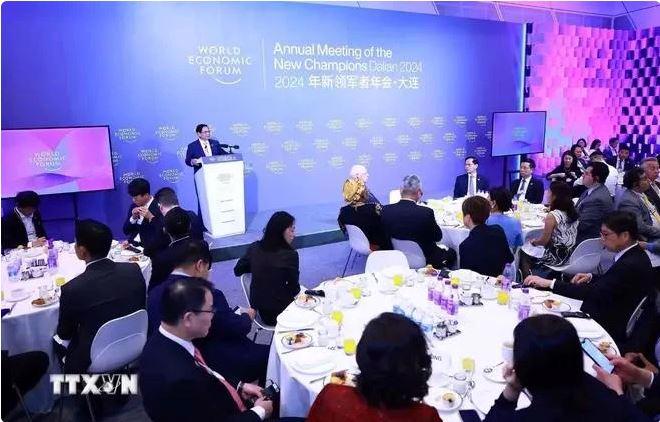
Prime Minister Pham Minh Chinh and Executive Chairman of the World Economic Forum (WEF) Prof. Klaus Schwab on June 26 co-chaired a dialogue with leaders of about 20 major WEF economic groups on the sidelines of the 15th WEF Annual Meeting of the New Champions in China’s Dalian city, according to a report from the Vietnam News Agency (VNA).
The event, organized in the form of a working breakfast, focused on seeking ways to strengthen cooperation to promote Vietnam’s economic growth and discussing partnership in digital transformation, high technology, green transition, and the role of Vietnam in the global supply chain.
Participants had open, sincere and straightforward discussions to find new cooperation opportunities in the time to come. They hailed Vietnam’s growth rate and the improvement of its investment and business environment, especially the fact that the country’s digital economy accounted for about 16% of its GDP in 2023.
Prof. Schwab was quoted by the news agency as saying at the event that he is delighted at the WEF’s close cooperation with Vietnam, a rising star of the world economy.
Mr. Brand Cheng, Chairman and CEO of Foxconn, which is present in five localities of Vietnam with 80,000 staff and a total investment of about $4 billion, was also quoted by VNA as remarking that Vietnam is growing fast and his company is developing with the country.
Meanwhile, according to a representative from Pepsico, after 30 years, the firm has invested $850 million in Vietnam and will continue to pour more capital into the country, especially in the field of agriculture, food processing, support to small- and medium-sized enterprises, and plastics recycling.
Delegates raised many questions related to Vietnam’s policy and regulations in digital economy and green economy such as electronic signature in the banking and finance sectors green certificates, ensuring electricity supply and energy conversion, financing for renewable energy and incentives for high-tech fields.
Addressing the dialogue, PM Chinh said in the context that impacts of the COVID-19 pandemic have still lingered and polarization, tension, conflict, strategic competition, and climate change have affected the world economy and countries, Vietnam has chosen to priories growth promotion and taken measures to rein in inflation, stabilize macro-economy, and ensure major balances of the economy.
Vietnam recorded a GDP growth of 8.02% in 2022, 5.5% in 2023 and 5.665 in the first quarter of 2024, with economic expansion trend continuing, the PM noted.
At the same time, he said, the country’s macroeconomy has been basically stable, inflation controlled, and major balances of the economy guaranteed; public debt, government debt, and foreign debt are much lower than allowed limits; and the Vietnamese domestic currency is still in the group with the least devaluation compared to other countries in the region.
Regarding future orientations, PM Chinh said that Vietnam will continue to renew traditional growth drivers and strongly promote new growth motivations, with priority areas being digital economy, green economy, circular economy, sharing economy, and knowledge-based economy. These are also trendy development fields in the world, he added.
The Vietnamese Government leader underlined that in the current context, Vietnam will continue choosing to priorities growth and roll out flexible policies suitable to the conditions and circumstances of the country and the world situation and trends. He proposed that investors continue to accompany Vietnam in fulfilling the goal of promoting growth associated with maintaining macroeconomic stability, controlling inflation, ensuring major balances, ensuring social security, and improving people’s living standards.
Vietnam will continue to maintain political stability, social order and safety, consolidate a peaceful and stable environment for development, and ensure the legitimate and legal rights and interests of investors, while promoting reduction and simplification of administrative procedures, constantly improving the investment environment to make sure that investors feel secure in doing business and operating long-term and effectively in Vietnam, he pledged.
He proposed the continuous promotion of the spirit of “harmonized interest, shared risk” and the companion between the State, businesses, and the people.
Mentioning power supply, PM Chinh said that in 2024, although power consumption has increased 15% and exceeded a record level of 1 billion kWh per day on some days, power supply has still been ensured. He affirmed that with comprehensive solutions, Vietnam will not suffer power shortage.
At the same time, Vietnam is working hard to transit to green power and considering the issuance of the direct power purchase agreement (DPPA) mechanism, according to the PM.
The Government is about to issue a decree related to implementing the global minimum tax and amending the investment incentive policy from mainly tax incentives to financial, cost, and land incentives for priority projects, he revealed.
The Vietnamese leader said that Vietnam's orientation is to attract investment selectively, prioritizing projects in emerging fields and projects with high technology, high added value, and spillover and connection effects, especially those serving new economic growth drivers, promoting digital transformation and green transformation, while strongly developing a number of new breakthrough and strategic fields such as semiconductors and artificial intelligence (AI).
He mentioned a number of measures to promote green growth, and highlighted Vietnam’s efforts to reduce emissions in agriculture, including the 1-million-hectare high-quality rice project in the Mekong Delta, the first of its kind in the world.
Vietnam is greatly interested in experience, mechanism proposals and policy recommendations, he stated, asking the WEF and partners to strengthen cooperation with Vietnam in consulting and contributing to the development and planning of appropriate and effective policies, and create favorable conditions for Vietnam in engaging in WEF initiatives and ecosystems.
He proposed that the WEF and partners continue promoting the important role in connecting, supporting and encouraging businesses and investors to seek opportunities and conduct cooperation and investment in Vietnam, thus contributing to the fast and sustainable growth of the Vietnamese economy.


